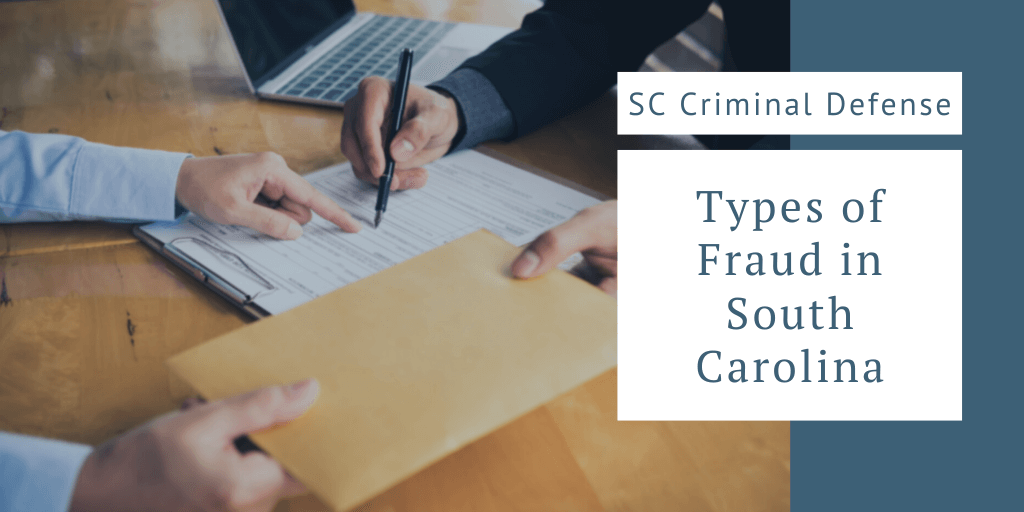
Decoding Your Insurance Declarations Page
November 29, 2021
Thinking About Separating? Here Are Some Basic First Steps
March 30, 2022Fraud is a matter that’s taken very seriously in South Carolina. Depending on the type, fraud charges can result in a felony conviction at either the state or federal level, and the most serious charges can carry jail time or heavy fines.

WHAT IS FRAUD?
Fraud is a deliberate act, or failure to act, to secure an unfair or unlawful benefit for an individual or an institution using either deception, false claims, suppression of the truth, or other unethical means. In other words, fraud is intentionally misleading someone or using deceptive tactics to unfairly gain something beneficial for yourself or your institution.
A fraud conviction requires a prosecutor to prove beyond a reasonable doubt that you have knowingly and intentionally deceived.
COMMON TYPES OF FRAUD
Check fraud
Knowingly paying by check or bank transfer for an item, service, rent, etc. when you don’t have the funds in your bank account is considered fraud, according to South Carolina state code. Knowingly being the keyword, however, because a prosecutor needs to prove that you knew you didn’t have the funds at the time of the payment in order to convict you.
Tax fraud
Tax fraud occurs when you report false information on your tax return. Typically this consists of lying about your income or about the deductions you have in order to pay less in taxes. If the IRS finds evidence of what they believe to be tax fraud, you could be audited. Failure to file a return at all, when you should, is another form of tax fraud known as tax evasion.
Mail fraud
Mail fraud is any form of fraud where the perpetrator uses the mail system in some capacity in carrying out the crime. The use of mail does not have to be an integral part of the fraud in order for it to be considered mail fraud. This can include soliciting donations through the mail for a fake charity, mailing merchandise to someone who did not order it and then demanding payment, or mailing false documents- which usually look like IRS documents- to obtain personal information that can be used to steal money from the victim. Mail fraud is a federal offense due to its use of the United States Postal Service, which is a federal institution.
Wire fraud
Similar to mail fraud, wire fraud is any kind of fraud that takes place over a form of electronic communication, like the internet or a telephone. During this type of fraud, perpetrators use electronic communication to misrepresent themselves in order to obtain money or other property. This can include making an online purchase with a stolen credit card or money scams where the perpetrator requests for money to be electronically transferred to them with the promise to pay it back even though they have no intention to. Wire fraud is considered a federal offense because it has the potential to take place across multiple states, and can carry severe penalties.
Healthcare fraud
Healthcare fraud is carried out by healthcare providers and occurs when they bill private insurance, Medicare, or Medicaid for services they didn’t provide. This can include billing for services that cost more than the actual procedures performed, billing twice or more for the same service, or staggering bill submissions out over time rather than bundling services together in order to charge more.
Internet fraud
As the name suggests, internet fraud is any kind of fraud that is carried out over the internet. This includes cybercrimes like identity theft, phishing, or hacking someone’s account in order to demand payment.
Mortgage and bank fraud
Lying on a loan or mortgage application is a form of fraud because it uses deceptive means to obtain money. Mortgage fraud typically consists of lying about a property while trying to secure a mortgage loan for it. This can include lying about your income in order to secure a loan or illegally flipping a home by buying it at a low price and then having it falsely appraised at a much higher value to sell for profit.
Breach of trust
Breach of trust happens when the perpetrator is entrusted with someone else’s money or property, but instead uses those assets for their own benefit. This is essentially South Carolina’s version of embezzlement and can either be charged as a misdemeanor or a felony depending on the value of the assets involved. An example of this would be a caregiver using their client’s checkbook to write checks to themself.
CONTACT SEIFERFLATOW
Knowing the law is the first step in protecting yourself when you’ve been accused of fraud. The next is hiring a knowledgeable attorney right away. If you’re facing fraud charges in South Carolina, our experienced criminal attorney will listen to your side and help you develop a defense that will result in the best possible outcome. Contact our South Carolina office to speak to an attorney or schedule a consultation.
